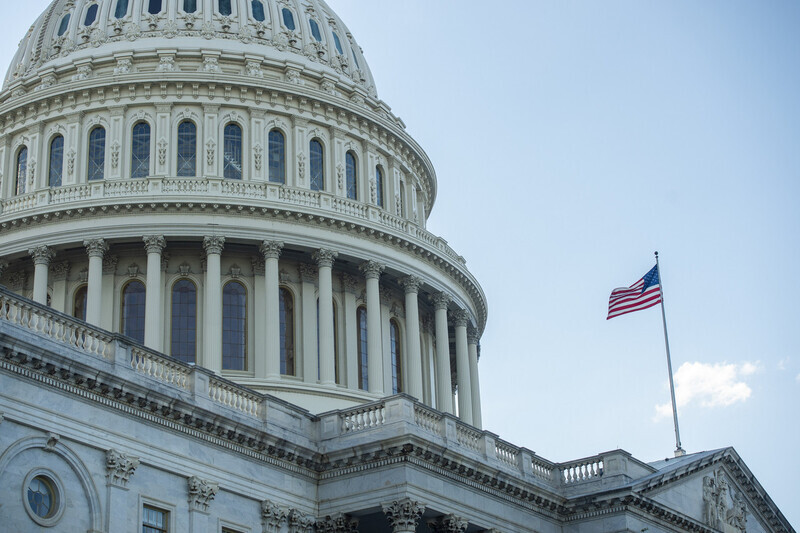hankyoreh
Links to other country sites 다른 나라 사이트 링크
[Column] US Capitol riot’s warnings for South Korea


Were the rioters who broke into the US Capitol building on Jan. 6, 2021, acting on orders from Donald Trump? The question is being fiercely debated by a House select committee investigating the Jan. 6 attack on the Capitol.
The first hearing, which was broadcast live on June 9, was watched by more than 20 million people.
In the Jan. 6 attack, thousands of Trump supporters who believed the November 2020 election had been stolen from him stormed the Capitol to prevent a joint session of Congress from certifying the election results. Five people died and hundreds were injured as the police put down the riot.
It’s been called the greatest crisis US democracy has ever seen.
In his book “Hoax: Donald Trump, Fox News, and the Dangerous Distortion of Truth,” CNN news anchor Brian Stelter argued that Fox News had played a decisive role in the twin tragedies of the Trump era: the huge death toll of COVID-19 and the attack on the Capitol.
Fox News is the US’ No. 1 news channel, watched religiously by the country’s conservatives. The channel doesn’t balk at broadcasting false information under the guise of “opinion.”
When Fox News said something to Trump’s liking, he would tweet it, which would then be reported on by Fox. According to Stelter, the falsehoods that spread like this impacted COVID-19’s death toll of more than a million people and the assault on the Capitol.
When the rioters were running wild through the Capitol, Stelter related, House Minority Leader Kevin McCarthy was taking shelter and racking his brains about what to do. While he sympathized with Trump’s claim about a stolen election, he realized that everything was in jeopardy now. He wanted Trump to stop the rioters, so he called the place with the biggest impact on Trump’s life: Fox News.
According to Stelter, Trump hadn’t paid attention when McCarthy called because he was absorbed in scenes of the protest on Fox News that looked like a “rock concert.”
It was only after Fox News broadcast an interview with McCarthy that Trump tweeted for his supporters to “go home,” while quoting a Fox anchor’s remarks about “law and order.”
According to the House select committee, Trump’s claims about election fraud were dismissed by close aides — including his own daughter, Ivanka — as nonsense, but spread rapidly to his supporters via Fox News.
Liz Cheney, a US representative in the Republican Party and vice chairwoman of the Jan. 6 committee, said that Trump had “summoned the mob, assembled the mob, and lit the flame of this attack.”
Stelter’s blow-by-blow account of the COVID-19 pandemic in the US convincingly shows that the virus wouldn’t have spread so quickly if not for Trump and Fox News. The broadcaster mocked the US’ public health authorities early on in the pandemic in 2020 by giving a platform to medical experts who said the virus would be no worse than the flu.
Trump tweeted this information while refusing to initiate a mask mandate or social distancing. Trump and his friends at Fox apparently believed that the economic damage caused by public health measures would hurt his chances of being reelected.
Remarking that many of the COVID-19 deaths occurred in a demographic in which Fox viewers are overrepresented, Stelter castigated the broadcaster for jettisoning the journalist mantra of “minimizing harm” to consumers.
The tragedy produced by the combination of a populist politician like Trump and an incendiary media outlet like Fox News carries a warning for Korean society as well.
Korea has its own share of politicians who try to divide the public between “us” and “them” and who build their base through hatred and discrimination against the other side. It’s also true that newspapers tend to prosper when they twist the truth for their own private ends instead of fulfilling their duty of being a watchdog on power and capital.
The collusion between that kind of politician and media outlets can take innocent lives, undercut security, distort the economy, and jeopardize democracy.
“The role of the press as a forum for public debate is particularly important in the ‘post-truth’ era, in which appeals to subjective beliefs and emotions have a bigger impact than objective facts on forming public opinion. We need to combat fake news through both institutional reforms and our day-to-day behavior,” said Kim Ho-ki, a professor at Yonsei University, in a special lecture at the Graduate School of Journalism at Semyung University on June 2.
As we seek to build a healthy forum for public debate, journalists’ struggle to regain their credibility may be the most essential of all. Institutional support from the government and the political sphere is important, too.
But citizens also have a crucial role to play by weeding poisonous mushrooms out of the media and cultivating the beneficial ones. Posting thoughtful comments to praise good articles and criticize fake news, sharing outstanding reporting on social media, and spending money to support honest media — these are all examples of how we can make a difference in our daily lives.
Please direct questions or comments to [english@hani.co.kr]

Editorial・opinion
![[Column] Season 2 of special prosecutor probe may be coming to Korea soon [Column] Season 2 of special prosecutor probe may be coming to Korea soon](https://flexible.img.hani.co.kr/flexible/normal/500/300/imgdb/original/2024/0426/3317141030699447.jpg) [Column] Season 2 of special prosecutor probe may be coming to Korea soon
[Column] Season 2 of special prosecutor probe may be coming to Korea soon![[Column] Park Geun-hye déjà vu in Yoon Suk-yeol [Column] Park Geun-hye déjà vu in Yoon Suk-yeol](https://flexible.img.hani.co.kr/flexible/normal/500/300/imgdb/original/2024/0424/651713945113788.jpg) [Column] Park Geun-hye déjà vu in Yoon Suk-yeol
[Column] Park Geun-hye déjà vu in Yoon Suk-yeol- [Editorial] New weight of N. Korea’s nuclear threats makes dialogue all the more urgent
- [Guest essay] The real reason Korea’s new right wants to dub Rhee a founding father
- [Column] ‘Choson’: Is it time we start referring to N. Korea in its own terms?
- [Editorial] Japan’s rewriting of history with Korea has gone too far
- [Column] The president’s questionable capacity for dialogue
- [Column] Are chaebol firms just pizza pies for families to divvy up as they please?
- [Column] Has Korea, too, crossed the Rubicon on China?
- [Correspondent’s column] In Japan’s alliance with US, echoes of its past alliances with UK
Most viewed articles
- 1AI is catching up with humans at a ‘shocking’ rate
- 2[Column] Season 2 of special prosecutor probe may be coming to Korea soon
- 3Is Japan about to snatch control of Line messenger from Korea’s Naver?
- 4‘We must say no’: Seoul defense chief on Korean, USFK involvement in hypothetical Taiwan crisis
- 5Up-and-coming Indonesian group StarBe spills what it learned during K-pop training in Seoul
- 6The dream K-drama boyfriend stealing hearts and screens in Japan
- 7[Column] ‘Choson’: Is it time we start referring to N. Korea in its own terms?
- 8Amnesty notes ‘erosion’ of freedom of expression in Korea in annual human rights report
- 9Is N. Korea threatening to test nukes in response to possible new US-led sanctions body?
- 10Division commander ordered troops to enter raging flood waters before Marine died, survivor says